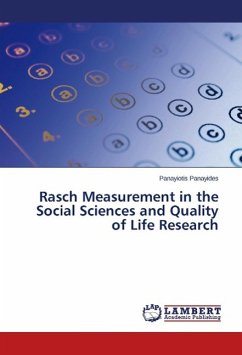Rasch measurement is a mathematical formulation of ideal measurement, if this were achievable. In the real world however, data are expected to deviate from ideal measurement due to measurement error, problematic test or scale design or inadequate construct definitions. Rasch analyses, apart from generating person estimates and item difficulties, investigate the discrepancies between the data observed and that which is expected by the model in an attempt to improve the instrument, the understanding of the construct and the overall measurement process. This book provides a brief introduction to Rasch measurement, explains its strengths and illustrates through examples how it can be used productively in the social sciences and quality of life research. The ultimate aim is to encourage researchers in the social sciences to appreciate the strengths of the models and to use the Rasch approach in their own work.
Bitte wählen Sie Ihr Anliegen aus.
Rechnungen
Retourenschein anfordern
Bestellstatus
Storno








